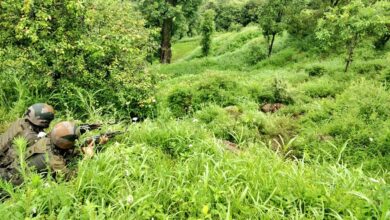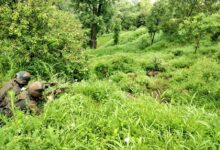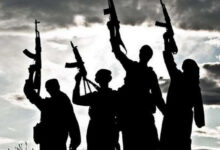Valley Observes Shutdown to Mourn Pahalgam Killings, PDP, NC Hold Separate Rallies; Tourists Join In, Reject Communal Narrative

Srinagar, Apr 23, KNT: Kashmir on Wednesday witnessed a complete shutdown as the Valley united in mourning and protest against the horrific Pahalgam militant attack that killed 26 people, including 25 tourists and a local resident. The attack, which has shocked the region, sparked spontaneous protests, symbolic strikes, and strong condemnations from all quarters of society.
In Srinagar, the historic Lal Chowk—the city’s commercial hub remained completely shut with shops closed and public transport off the roads. The silence was broken only by the slogans of protest rallies that snaked through the streets of the city. Similar scenes unfolded across other districts including Anantnag, Baramulla, Kupwara, Pulwama, and Budgam, where locals participated in marches demanding justice and denouncing violence.
The People’s Democratic Party, led by former Chief Minister Mehbooba Mufti, held a protest march from its Srinagar headquarters. Party leaders and supporters carried placards condemning the killing of innocent civilians and tourists. “This is not the Kashmir we know. Our identity is hospitality, not bloodshed. Those who carried out this attack want to destroy our culture and our economy,” Mehbooba told the media during the march.
Meanwhile, the National Conference also organized a protest rally in Srinagar, joined not only by party workers but also by a group of tourists who refused to leave the Valley despite the tragedy. “I am a Hindu from Maharashtra and I feel safer among Kashmiris than anywhere else,” said a tourist who marched with the NC group. “Religion has nothing to do with this violence. The people here are kind and welcoming.”
Omar Abdullah, though not physically present at the protest, issued a statement expressing solidarity with the victims and support for the public response. “The pain is collective, and so must be our condemnation. We must not let this incident divide us further,” he said.
From students to traders, civil society groups to religious leaders, the protests drew a cross-section of Kashmir’s population. In downtown Srinagar, youth carried banners that read “Tourists are our guests, not targets” and “Stop killing our conscience.” Similar scenes were reported in Shopian and Kulgam, where thousands took part in peaceful marches.
Locals also held candlelight vigils in Anantnag and Baramulla on Tuesday night to honour the dead, including Syed Adil Hussain Shah—a local Muslim from Pahalgam who died in the attack. His killing was widely seen as further proof that the perpetrators intended to sow fear and chaos indiscriminately.
Amid attempts by certain social media users and media outlets to communalize the attack, many Kashmiri netizens pushed back by sharing stories of locals who helped the injured tourists, organized rescue efforts, and condemned the violence in the strongest terms. “This is not just a tragedy, it’s a test of our collective humanity. The people of Kashmir are passing it with dignity and courage,” one user wrote.









